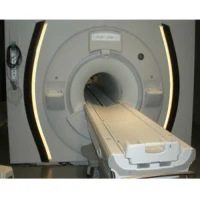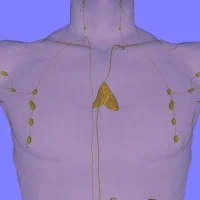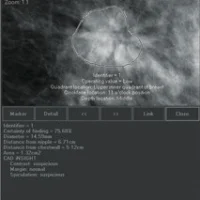An MRI exam begins for the patient with a screening questionnaire, when they answer questions about implanted devices and other details. Depending on the answers, much time may be taken up for the radiographer investigating type of implanted device. An article in press in the Journal of the American College of Radiology, by Ali Pirasteh and colleagues from the Department of Radiology and the Advanced Imaging Research Center at the University of Texas Southwestern Medical Center assessed whether implementing a web-based screening and check-in process for MRI appointments would improve workflow and reduce patient turnaround time at an outpatient MRI facility. In particular was time saved when patients elected to complete the questionnaire online prior to attending their appointment, thus enabling the radiographers to check the questionnaire some time beforehand? The online questionnaire does offer the patients the incentive of saving time when they come for their appointment. The primary outcome measured was the time taken by the technologist reviewing the patient questionnaire and performing any necessary follow-up. Timesheets were collected for a 6 week period.
Results
773 timesheets were included, of which 200 had used the online questionnaire. Interestingly, the average age of each group was similar at around 54 years. The average interview and screening duration for the online screening group (12.0±7.1min) was significantly lower than that of the traditional screening group (14.1 12.3 min) (P = .004).
See Also: Controlling Patient Workflow in a Radiology Department
The authors attribute the reduction in time taken for the online screening group to reducing the number of patients who had extreme delays - these led to subsequent delays of up to 2 hours in the traditional screening group. Although following up possible MRI contradictions takes a similar time, if this is only known on the day of the exam, there is a knock on effect for later appointments as well as a delay for the patient concerned. The authors note that at many centres that schedule a fixed number of MRI exams per day, delays may result in technologists’ working overtime, potentially entailing extra costs.
The conclusion? Online MRI screening is effective in reducing delays and patient turnaround time. Potentially online screening can reduce costs and increase patient satisfaction. And perhaps accuracy, as patient can fill in the questionnaire when it is convenient to them when they have the relevant medical information at their fingertips.
Image credit: Pixabay
Results
773 timesheets were included, of which 200 had used the online questionnaire. Interestingly, the average age of each group was similar at around 54 years. The average interview and screening duration for the online screening group (12.0±7.1min) was significantly lower than that of the traditional screening group (14.1 12.3 min) (P = .004).
See Also: Controlling Patient Workflow in a Radiology Department
The authors attribute the reduction in time taken for the online screening group to reducing the number of patients who had extreme delays - these led to subsequent delays of up to 2 hours in the traditional screening group. Although following up possible MRI contradictions takes a similar time, if this is only known on the day of the exam, there is a knock on effect for later appointments as well as a delay for the patient concerned. The authors note that at many centres that schedule a fixed number of MRI exams per day, delays may result in technologists’ working overtime, potentially entailing extra costs.
The conclusion? Online MRI screening is effective in reducing delays and patient turnaround time. Potentially online screening can reduce costs and increase patient satisfaction. And perhaps accuracy, as patient can fill in the questionnaire when it is convenient to them when they have the relevant medical information at their fingertips.
Image credit: Pixabay
References:
Pirasteh A, VanDyke M, Bolton-Ronacher J et al. (2016) Implementation of an online screening and check-in process to optimize patient workflow before outpatient MRI studies. J Am Coll Radiol. 2016 Jan 16. pii: S1546-1440(15)01214-4. doi: 10.1016/j.jacr.2015.10.036. [Epub ahead of print]
Latest Articles
MRI, Workflow
A recently published study by Ali Pirasteh and colleagues from the Department of Radiology and the Advanced Imaging Research Center at the University of Texas Southwestern Medical Center, in press in the Journal of the American College of Radiology, asses










